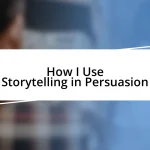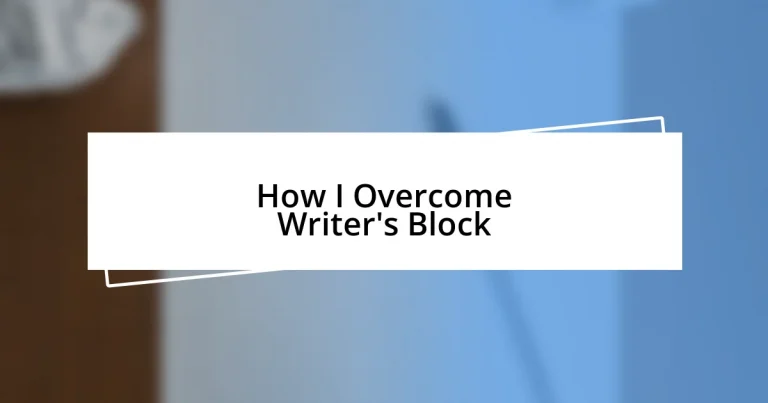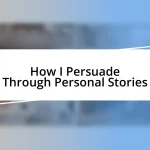Key takeaways:
- Writer’s block often arises from fear, self-doubt, and external pressures, emphasizing the importance of self-awareness in overcoming it.
- Practical techniques to combat writer’s block include freewriting, changing scenery, using prompts, and setting achievable writing goals.
- Establishing a consistent writing routine and reflecting on progress can enhance creativity, motivate persistence, and foster personal growth as a writer.
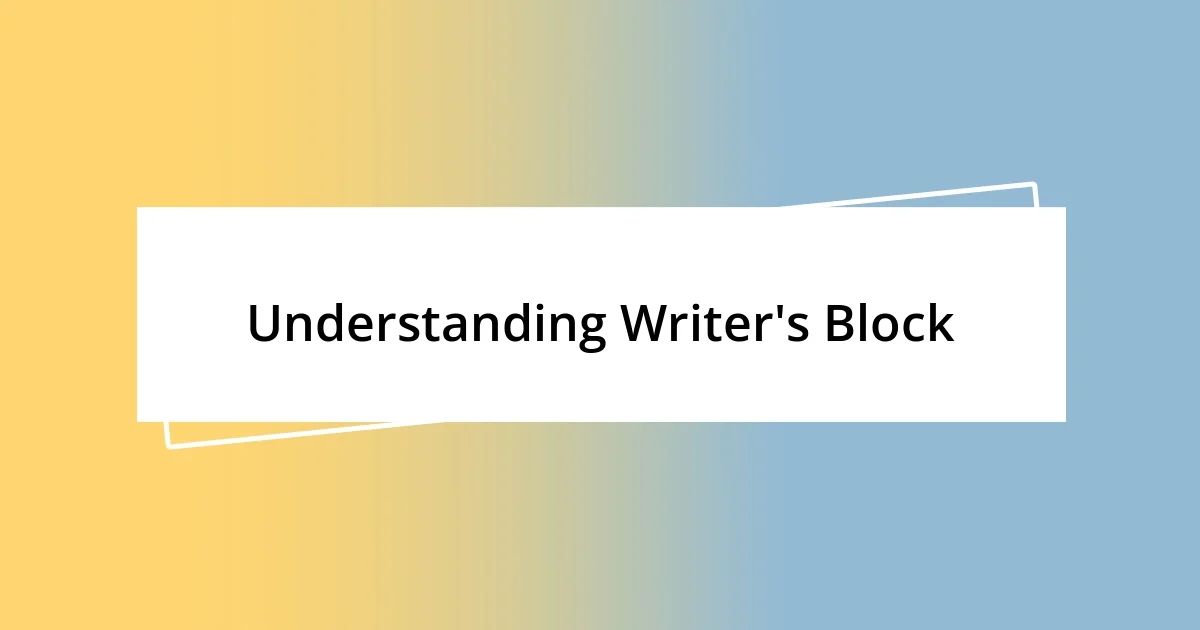
Understanding Writer’s Block
Writer’s block can feel like an invisible wall, one that suddenly appears without warning. I remember sitting in front of my laptop, fingers poised above the keys, yet my mind was blank. Have you ever felt that sense of desperation, as if the words you once had at your fingertips have now vanished entirely?
At its core, writer’s block often stems from a blend of fear and self-doubt. I can’t count the times I’ve doubted my ideas or worried that my writing would never be good enough. It’s as if the pressure to create something perfect stifles the creativity that initially sparked my passion for writing. Isn’t it ironic how our own expectations can become the very thing that holds us back?
Understanding writer’s block is not just about recognizing the symptoms; it’s about digging deeper into the emotions behind them. Each time I’ve faced this challenge, I’ve discovered it was tied to a larger issue—whether it was burnout, a lack of inspiration, or even personal struggles. It’s crucial to ask ourselves what’s truly at the root of our blockage: Is it external stress, or maybe internal conflict? The answers can pave the way to overcoming it.

Identifying Your Triggers
When tackling writer’s block, identifying your triggers is a vital first step. For me, I’ve noticed that certain situations or feelings often lead me to a mental standstill. Recently, I found myself stuck during a particularly busy week at work, where the pressure and stress morphed into an overwhelming sense of doubt about my writing. Paying attention to these patterns has been key to my process.
I learned that my creative blocks often arise in moments of perfectionism. I tend to be my own toughest critic, and this self-imposed pressure can sometimes paralyze my creativity. Remember the last time you felt frustrated? I bet it wasn’t just about the words; it’s often a larger memory, a trigger connected to those feelings. For example, I noticed that the day I was rejected from a publication I had high hopes for, I struggled to write anything new for weeks. Acknowledging those moments helps me understand my triggers better.
To truly overcome writer’s block, I keep a journal to pinpoint these emotional triggers. Whether it’s stress from my job, a recent personal setback, or simply feeling uninspired, jotting down thoughts helps me recognize the recurring themes that lead to resistance. This self-awareness ultimately transforms my relationship with writing. Knowing what holds me back allows me to navigate through or around it, rather than letting it paralyze my creativity.
| Triggers | Personal Experience |
|---|---|
| Stressful Life Events | Feeling overwhelmed during busy weeks has led to severe writing blocks. |
| Perfectionism | Self-criticism after a setback kept me from expressing my ideas for an extended period. |
| Lack of Inspiration | Falling into the routine caused me to struggle with generating new concepts. |

Practical Techniques to Overcome Block
When I hit a wall with my writing, I often turn to some simple yet effective techniques that have helped me regain my flow. One of my favorites is setting a timer for short writing sprints. This creates a sense of urgency that can kick my brain into gear. I remember a day when I felt completely uninspired; I set a timer for just 10 minutes and forced myself to write anything—no judgment. Surprisingly, those minutes produced some of my most honest thoughts, freeing me from the paralysis of overthinking.
Here are some practical techniques that have worked for me:
- Freewriting: Write continuously for a set time without worrying about grammar or structure. Let your thoughts flow freely.
- Change of scenery: Sometimes, a new environment can spark creativity. Whether it’s a cafe or a park, a shift in surroundings can refresh your perspective.
- Prompts and exercises: Using prompts, like “What if?” scenarios, can help fuel your imagination and inspire new ideas.
- Take breaks: Walking or engaging in a different activity can provide mental space, allowing ideas to settle and resurface organically.
Another technique I cherish is embracing imperfection. I’ve learned to quiet that nagging inner critic by reminding myself that the first draft doesn’t need to be perfect—it just needs to exist. I recall a time when I spent weeks obsessively rewriting a single paragraph, only to realize I was standing in my own way. Allowing myself to write poorly at first has often resulted in a clearer path to refining those ideas.
Incorporating these techniques consistently has transformed my writing process. The key is to find what resonates with you because sometimes the right method is the one you discover on your own journey.
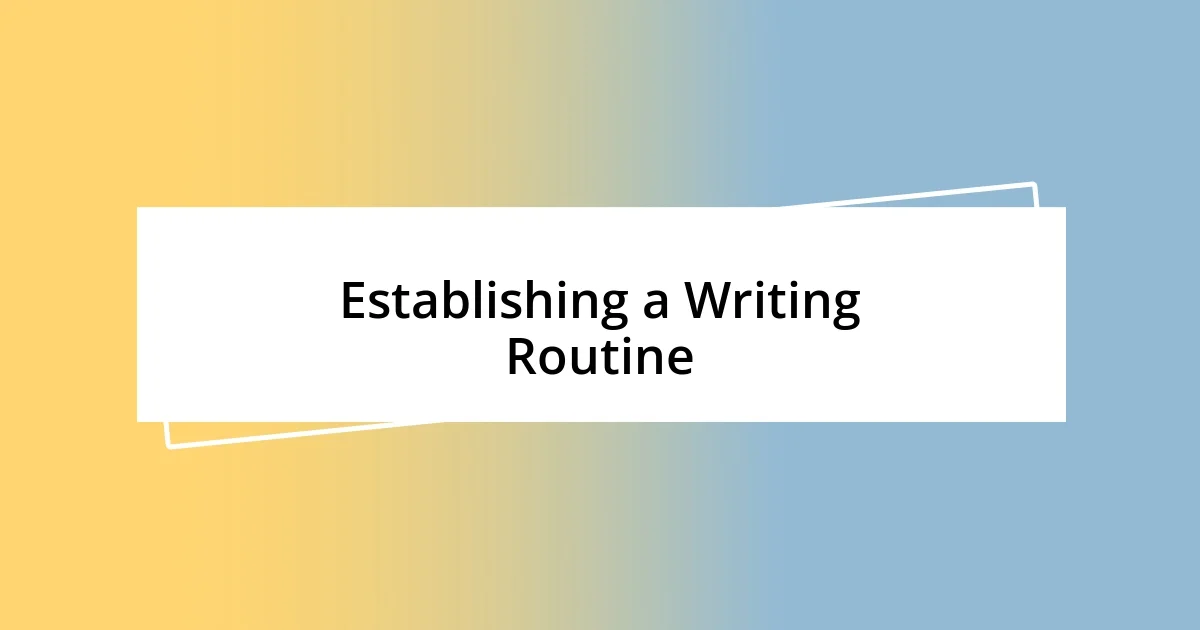
Establishing a Writing Routine
Establishing a writing routine has been a game-changer for me. I find that creating a dedicated time each day signals my brain that it’s ‘go time.’ For instance, I started waking up an hour early to write, and it transformed how I approach my work. That quiet morning time, with a hot cup of coffee in hand, seems to coax my creativity into action. Have you ever noticed how your mind feels clearer at the start of the day?
Initially, I struggled with keeping things consistent. Some days felt unfathomably heavy, and the last thing I wanted to do was write. Yet, I remember one particularly bleary morning when, despite my reluctance, I sat down and forced myself to type for just 10 minutes. Surprisingly, I uncovered a fleeting thought about a dream I had the night before, and from there, the words just started flowing. It reminded me that even on tough days, just showing up can lead to unexpected breakthroughs.
To maintain this routine, I also set small, achievable goals. Rather than aiming to write a full chapter, I focus on finishing a paragraph or even a few sentences. This way, I celebrate small wins, which often boosts my motivation. When was the last time you felt that rush of accomplishment? It’s fascinating how these little victories form the building blocks of my confidence as I continue to write. Establishing this routine anchors my creativity, making writing a more enjoyable and productive process.
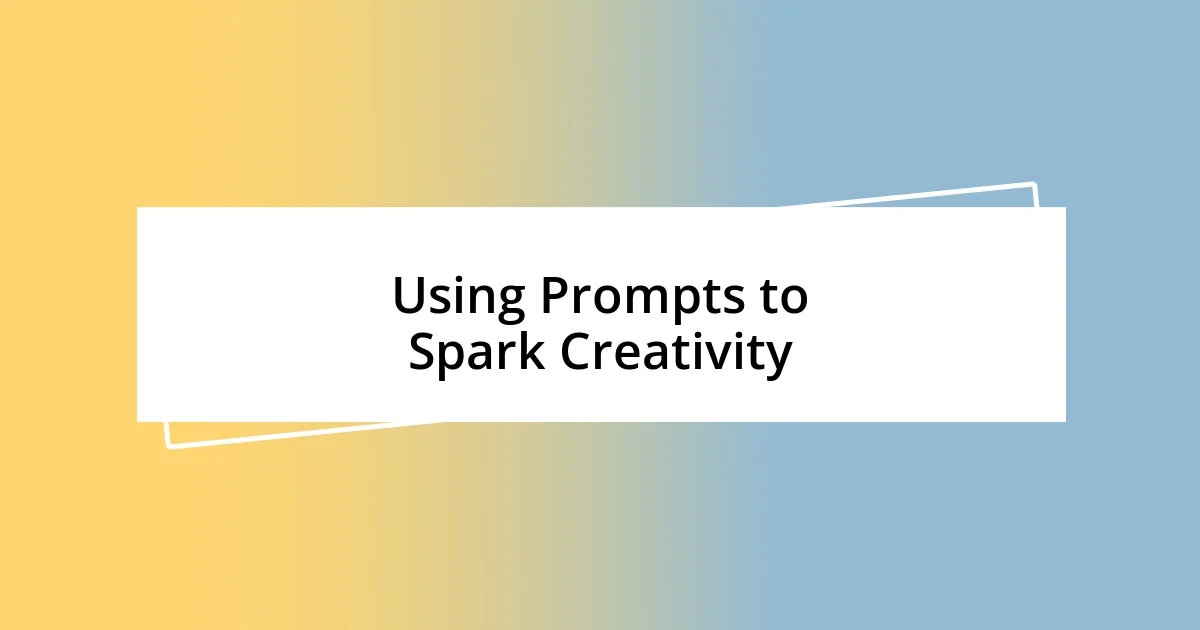
Using Prompts to Spark Creativity
When I find my creativity stalling, using prompts has always served as a lifeline. One evening, feeling particularly uninspired, I stumbled across a quirky prompt: “Describe a diary entry from an alien visiting Earth for the first time.” It propelled me into a world of imagination, and I laughed as I penned down the alien’s bewilderment over everyday objects like toasters and traffic lights. That light-hearted exercise reminded me of how playful writing can be—it’s all about freeing my thoughts from the weight of seriousness.
I often explore themed prompts, too. For instance, I once tried a seasonal prompt where I wrote about how autumn affected my mood and creativity. By focusing on specific elements—like the rustling of leaves or the chill in the air—I discovered not just the joy of the season itself but also my deep connection to nature. Have you ever noticed how sensory details in writing can evoke strong emotions? Those details often slip into my work as I paint vivid imagery for my readers while rekindling my own feelings.
Sometimes, I create my own prompts based on personal experiences. Last week, I challenged myself with a simple yet profound question: “What’s a cherished childhood memory that shaped who you are today?” The reflection took me down memory lane, and I found myself writing about summer afternoons spent in my grandmother’s garden. Reconnecting with those emotions not only sparked my creativity but also deepened my understanding of my own journey as a writer. So, have you considered how your past can fuel your present creativity? It’s a powerful tool in breaking through that daunting writer’s block.
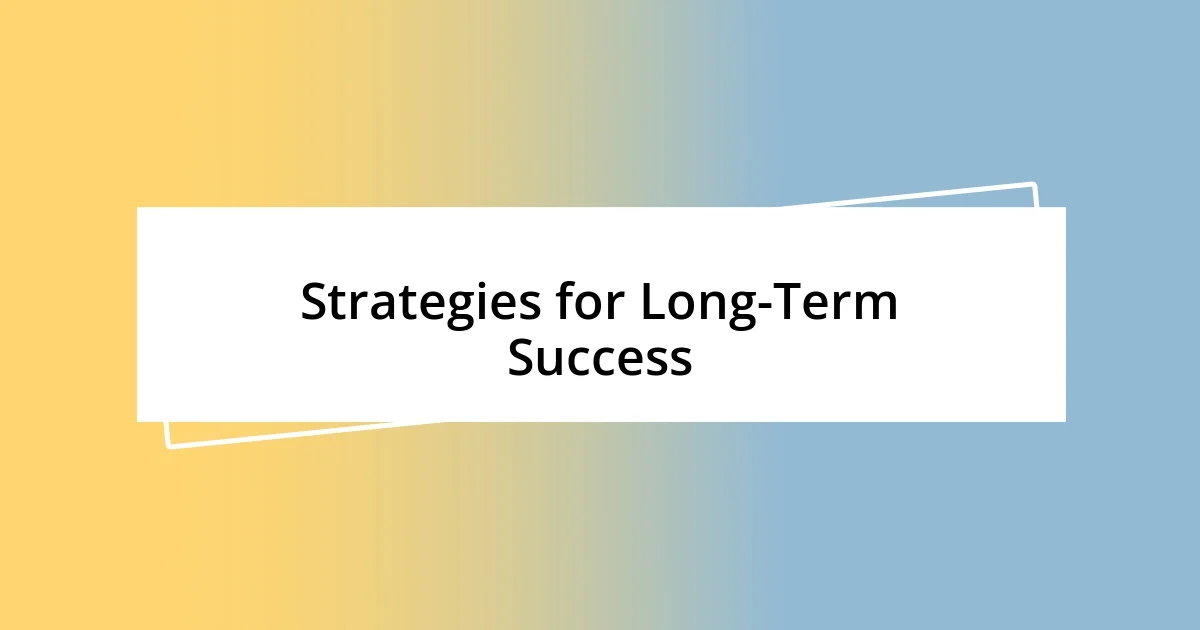
Strategies for Long-Term Success
One strategy that’s been incredibly effective for me is to immerse myself in different environments. For example, last summer, I decided to work from a local park instead of my usual desk. The fresh air and sounds of chirping birds created a unique backdrop that sparked new ideas in ways my usual setting couldn’t. Have you ever experienced how a change of scenery can reignite your passion for writing? It brought an element of freshness that I didn’t realize I was missing.
I also believe in the power of community. Connecting with fellow writers has made a significant difference in my journey. I recall joining a local writing group and being surprised by how sharing my struggles with writer’s block made me feel less isolated. Listening to their stories and challenges inspired me to think differently about my own process. Have you ever thought about how collaboration can lead to motivation? It’s amazing how others’ insights can lead you to breakthroughs you might not discover alone.
Lastly, I’ve found that celebrating progress, however small, contributes to long-term success. Like the time I completed a particularly challenging piece and treated myself to a nice dinner. This simple act of acknowledgment not only motivated me to keep pushing forward but also reinforced the joy of writing. Do you remember the last time you celebrated a small victory? Each moment of recognition fuels my commitment to the craft, reminding me that every step—no matter how modest—is part of a larger journey toward success.
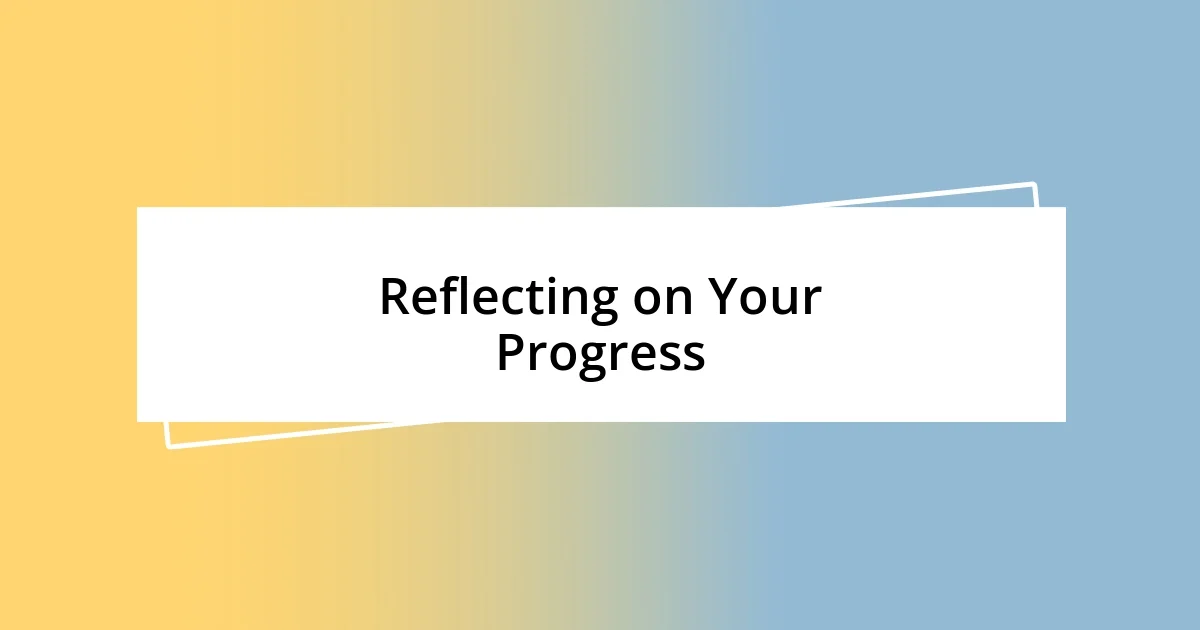
Reflecting on Your Progress
Reflecting on one’s progress is a crucial step I often overlook in my writing journey. There was a time when I felt trapped in a continuous cycle of frustration, unable to see past my self-doubt. One day, I decided to revisit old journals filled with my past writings. What struck me was how much I had grown; the very pieces that once felt inadequate now seemed like stepping stones that paved the way to my current style. Have you ever taken a moment to look back and realize just how far you’ve come?
I find that tracking my progress in small ways really helps. I usually keep a checklist of daily writing goals, such as word counts or hours spent writing. It became so rewarding to check off these small accomplishments! One particularly tough week, I felt disheartened with my output until I looked back at my checklist and saw that I’d written consistently. It dawned on me that progress doesn’t always mean producing perfect work; it’s often about persistence. Can you relate to the feeling of being overwhelmed by the entire journey instead of just appreciating the small victories along the way?
Another method that has worked wonders for me is to jot down lessons learned after finishing a project. Recently, after completing a challenging piece, I created a list that included what inspired me, what I struggled with, and how I overcame those obstacles. It felt cathartic! This reflection not only provided closure but also armed me with insights for future writing. Have you considered how reflecting on your experiences can guide your next steps? It’s like having a personal roadmap to navigate your creativity, helping you to anticipate challenges and celebrate your victories.





